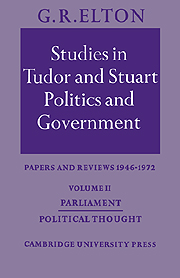31 - The Political Creed of Thomas Cromwell
Published online by Cambridge University Press: 23 December 2009
Summary
Two views are current concerning the political views of Thomas Cromwell. One – the more common – holds that he believed in absolute monarchy and desired to establish it in England. The Abbé Constant, summarizing (as was his wont) other people's views in language free from other people's reservations, stated it most starkly: he thought that Cromwell aimed at making Henry ‘tout-puissant’ and that his ministry was the golden age of Tudor despotism. Quite recently, an ingenious theory, buttressed with a misunderstood document, based itself on this general conviction. This view has suffered curiously little from the growing realization that the Henrician Reformation rested on conscious co-operation with Parliament and that the propagandists of the time never produced a theory of absolute monarchy. Pollard, the defender of Henry VIII's constitutionalism, seems to have held that, though the king had no ambitions for a genuine despotism, Cromwell certainly harboured such ideas. The other view, recently given support for Dr Parker, holds that Cromwell did not bother at all about theoretical issues, that his ‘resolutely Philistine type of mind’ despised political theory, and that he never thought beyond the establishment of a sovereign monarchy. Thus, too, Mr Baumer thought that Cromwell saw in Parliament ‘only a means of executing the royal will’, but also that he ‘had no theoretical views whatever about the relation of the king to the law’ – passages hard to reconcile but suggestive of Dr Parker's views rather than M. Constant's.
- Type
- Chapter
- Information
- Studies in Tudor and Stuart Politics and GovernmentPapers and Reviews 1946–1972, pp. 215 - 235Publisher: Cambridge University PressPrint publication year: 1974
- 1
- Cited by



